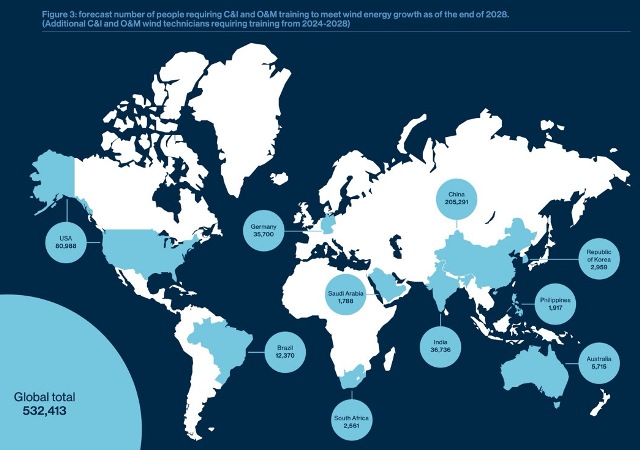The world will require 532,000 new wind technicians by 2028 to meet growing demand for onshore and offshore wind energy, according to the Global Wind Workforce Outlook report by the Global Wind Energy Council (GWEC) and the Global Wind Organisation (GWO). Of these, 40 percent will need to be new entrants, underscoring the need for a resilient pipeline of skilled professionals to support global wind energy expansion.
The report released today emphasizes the importance of governments and industry investing in workforce development to meet net-zero and renewable energy targets. This includes vocational training, international training standards, and socio-economic policies for a just transition from fossil fuels.
Nine Steps for Workforce Development
The report outlines nine actions for policymakers to address workforce challenges:
Set workforce targets within national energy policies.
Introduce STEM education to prepare students for wind energy roles.
Fund workforce training programs, apprenticeships, and upskilling initiatives.
Promote local job creation through industrial policies.
Support reskilling pathways for workers transitioning from carbon-intensive sectors.
Encourage diversity, equity, and inclusion to attract and retain talent.
Address workforce mobility and dislocation through strategic policies.
Enforce strict health and safety standards for wind workers.
Adopt global training standards, tailored to local conditions.
Industry Leaders Call for Action
Ben Backwell, CEO of GWEC, stressed that accelerating wind energy deployment is vital to achieving global climate goals. “The nine steps outlined in this report provide a roadmap to turn ambitions into projects on the ground,” he said, adding that a well-trained workforce is key to scaling up the industry.
Jakob Lau Holst, CEO of GWO, emphasized the need for government action. “To achieve resilient supply chains of skilled personnel, we need investment in vocational training and removal of regulatory barriers,” he said.
Training Needs in Key Markets
The report focuses on ten countries — Australia, Brazil, China, Germany, India, the Philippines, South Korea, Saudi Arabia, South Africa, and the U.S. — which represent 73 percent of the training needs for commissioning and operations technicians by 2028.
The findings, unveiled at GWEC’s Wind Energy Summit 2024 in Incheon, South Korea, highlight the critical role of skilled technicians in bridging the gap between project planning and operation, accelerating the fight against climate change.

